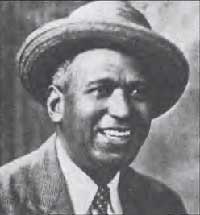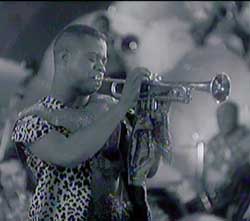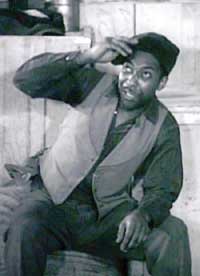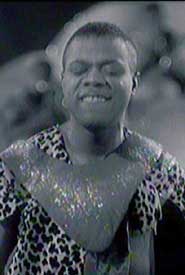Rhapsody in Black & Blue (1932) features the that amusing & exciting tune "I'll Be Glad When You're Dead You Rascal You." This delightsome song was written by Roaring Twenties ragtime performer & vaudevillian Charles "Cow Cow" Davenport.
 Cow-Cow sold all rights cheaply & never received a dime of royalties, & lived generally in poverty though still performing into the 1940s. I've reproduced a portrait of Cow-Cow at right, just to give him due honor, even though he's not otherwise associated with the film here discussed. Cow-Cow sold all rights cheaply & never received a dime of royalties, & lived generally in poverty though still performing into the 1940s. I've reproduced a portrait of Cow-Cow at right, just to give him due honor, even though he's not otherwise associated with the film here discussed.
Louis Armstrong in any case made the song his own, & it remained forever his, despite that many others covered it in years to come. As the soundie opens, a husband who likes to play at being a jazz drummer has set up a washtub & chair kit with kitchen utensils for drumsticks, joyfully drumming along with a 78 rpm record of Louis Armstrong singing "Shine."
His crabby harridan of a wife demands he get his ear "away from that jazz box" & help her clean the house. Sad to say, as with all too many Hollywood portraits of black America, this guy is a stereotypical "lazy darky" who just won't do anything but listen to jazz. It's nevertheless witty in places & the performers are doing their best to bring off the comedy.
The missus gets so mad at his laziness that she wacks him on the head with a mop, He loses consciousness while the record is playing 'I'll Be Glad When You're Dead You Rascal You," & he goes into a dream.
 He finds himself dressed in a mardi gras military outfit enthroned as the King of Jazzmania, with Louis Armstrong giving the king a command performance. He finds himself dressed in a mardi gras military outfit enthroned as the King of Jazzmania, with Louis Armstrong giving the king a command performance.
We're treated to such witty lyrics as "Boy, I brought you into my home/ You wouldn't leave my wife alone/ I'll be glad when you're dead you rascal you./ You bought my wife a bottle of Coca Cola/ So you could play on her Victrola/ Ha, you dog! I'll be glad when you're dead you rascal you."
Sachmo is dressed in a leopard skin & his band (the Sebastian New Cotton Club Orchestra) wears eccentric Carribean clown outfits.
I would presume the jungle-boy outfit wasn't Armstrong's idea, but he still had the outfit for his live-action appearance in the Betty Boop cartoon I'll Be Glad When You're Dead You Rascal You (1932).
The throne room seems to be floating on a sea of bubbles (referencing his wife's mop bucket). There's a break between numbers as our dreaming hero asks about where he's at, then Sachmo picks up his horn & reprises "Shine."
Also known as "That's Why They Call Me Shine," a 1910 jazz tune by Cecil Mack & Lew Brown, the lyrics are kind of demeaning: "O Chocolate drop, that's me/ Cuz my hair is curly/ Just because my teeth are pearly.../ That's why they call me Shine." But you can't fault the delivery, & when Louis' gotten through the lyrics he starts on the horn, & good lord it's godly stuff.
What a dad gum marvel of an entertainer Louis Armstrong was. Even in the ridiculous outfit he's just a startling beauty with enough talent for a hundred great jazz men.
 Operatic folk-blues is the best discription of the powerful voice of George Dewey Washington, who sings two songs in the one-reel soundie Ol' King Cotton (1930).
Operatic folk-blues is the best discription of the powerful voice of George Dewey Washington, who sings two songs in the one-reel soundie Ol' King Cotton (1930).
He was a singer, actor & comedian of the Harlem Rennaisance. He toured America from one coast to the other in Roaring Twenties as one of the giants, first on the "chitlin circuit" but soon doing white vaudeville, widely embraced by white audiences from Boston to Seattle. He became a star on Broadway in the 1930s.
Ol' King Cotton was Dewey's only movie, so a rare opportunity not to be missed, to see this great entertainer performing.
"I get so weary/ Of pickin' & a-pickin'/ That Ol' King Cotton/ Ain't nothin' but the weary blues" is sung in the shade of a sycamore tree on the edge of a cotton field beside an old log cabin far from the manor house.
It's perhaps just a bit too Uncle Tom's Cabin I fear, romanticizing black poverty in the south, without ever quite showing anybody doing any real work, thus playing into the "shiftless negro" stereotype. And that stereotype will get worse as the minimalist story progresses.
The white-defined movie industry's inability to avoid stereotyping cannot take away from Washington's powerful performance. As happy-go-lucky cottonpickers without a single thorn-prick to make banjo-playing difficult, George is a most appealing example, & most assuredly he sings with a mighty strength.
George's "mammy" comes out to remind him he has to catch a train for a job up north. We next see him in a Harlem store-house, the only hard worker among shiftless negro laborers in a hauling company. George finally tires of being the only one working & sits down beside his lazy buddies.
Talking to the other men, he gets all nostalgic for his southern home, though there's quite the argument about how horrible it is down there, burning up in the heat & then the levies break & your home -- a mere shack -- gets swept away.
George isn't convinced he wouldn't rather be under that sycamore tree waiting for his mammy's cooking. He sings "On the 'Sippy Shore," a high-drama song of longing with sweet word-portraits of the deadly muddy river.
This is a fine little film despite the stereotypes of romantic poverty & images of black men with nothing to do but sit. The great talent of George Dewy Washington simply gleams through every frame.
And the contrast between rural life along the Mississippi, & homesickness after moving to Harlem, was undoubtedly something many a soul amidst black audiences understood.
For despite the injustice & prejudice & lousy field jobs & lynchings left behind in the South, transplanted southern blacks could not help but have a certain longing for a few things of Dixieland, for we all recall fond moments of our childhood homes. The rough-hewn beauty of George Dewey Washington, with that amazing voice, was the right instrument to wring a tear.
copyright © by Paghat the Ratgirl
|

 Cow-Cow sold all rights cheaply & never received a dime of royalties, & lived generally in poverty though still performing into the 1940s. I've reproduced a portrait of Cow-Cow at right, just to give him due honor, even though he's not otherwise associated with the film here discussed.
Cow-Cow sold all rights cheaply & never received a dime of royalties, & lived generally in poverty though still performing into the 1940s. I've reproduced a portrait of Cow-Cow at right, just to give him due honor, even though he's not otherwise associated with the film here discussed. He finds himself dressed in a mardi gras military outfit enthroned as the King of Jazzmania, with Louis Armstrong giving the king a command performance.
He finds himself dressed in a mardi gras military outfit enthroned as the King of Jazzmania, with Louis Armstrong giving the king a command performance.